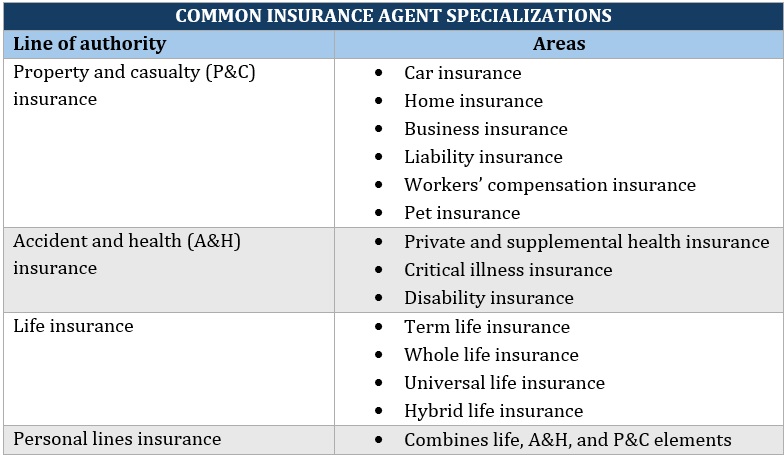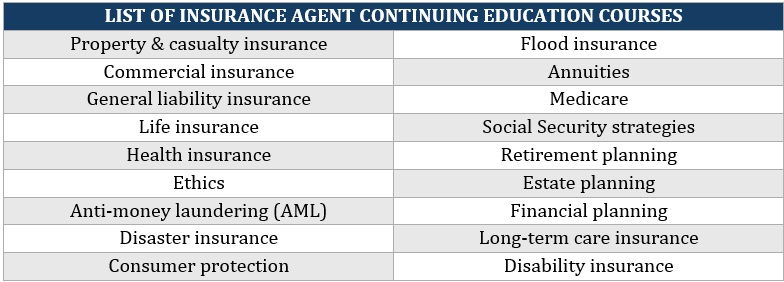

Getting proper training is one of the keys to a successful career as an insurance sales professional. But when presented with countless options, choosing the right insurance agent classes to grow your career is no simple feat.
To make this task easier, Insurance Business will give you a walkthrough of the different insurance training courses that can help you stay on top of your profession. We also talked to an industry expert who shared tips on how to pick the courses and training providers that can cater to your unique needs.
Whether you’re new to the industry or a seasoned veteran, this guide can prove handy. Read on and find out how your choice of insurance agent classes and training providers can help advance your career.
Before you can legally sell policies, you must get a license from the insurance regulation department in your jurisdiction. A major part of this is completing the pre-licensing coursework. This is designed to prepare aspiring insurance sales professionals for the state licensure exam.
Pre-licensure insurance agent courses are grouped into different lines of authority. You can choose one or several lines to specialize in. These are the most common specializations:

You can take these insurance agent classes online or in a face-to-face setting. The courses come with mandatory minimum hours detailed below:
If you’re wondering where you can earn your pre-licensing credits, you can check out our picks for the top 10 websites for insurance sales training.
After finishing the pre-licensing coursework, you’re ready to take the state licensure exam. The tests are divided into P&C and LA&H.
Each examination has between 50 and 200 items and must be completed in two to three hours. You’re only required to take the test for the insurance line that you plan on specializing in. If you want to practice in both lines, then you must also pass both tests.
Each state imposes different passing scores, but generally, you need to get at least 70% of your answers correctly to pass.
Once you pass, the results are valid for two to four years, depending on the state. You must apply for your insurance agent license within this period. If you fail to do so, you must retake and pass the exam again to regain your eligibility.
Find out more about your state’s licensing requirements in this step-by-step guide to getting your insurance agent license.
In a fast-changing industry, learning never stops once you get your license. Continuing education (CE) helps you serve clients better by keeping you abreast of the latest products and regulatory changes.
CE is also an important part of maintaining your insurance agent license. Most licenses are up for renewal every two years, although some states have renewal periods of three or four years.
Each state also has its own guidelines on how you can earn continuing education credits. Many allow online and self-study courses. A few require certain hours of classroom training. Generally, you will need to complete 24 hours of insurance training courses every two years.
The bulk of insurance agent classes you need to take cover the line you’re specializing in. Most states also require three hours of ethics training. Some impose certain hours for courses on insurance law and regulatory changes. Depending on your specialization, you may also need to take flood insurance training.
Here’s a list of the different continuing education courses insurance agents can take.

Find out each state’s continuing education requirements for insurance agents, brokers, and adjusters in this guide.
When investing in insurance training, you want to make sure that the courses you take impart the right skills and knowledge to help you earn the proper licenses and designation.
Caroline Alvarez, CEO of Insurance Training Center (ITC), notes that when it comes to choosing the best insurance training courses, there’s no one-size-fits-all solution.
“Each insurance agent navigates a unique path, shaped by their own constraints, learning objectives, timelines, and aspirations,” she explains. “And unfortunately, in our fast-paced lives, learning often takes a back seat to pressing priorities. However, those who truly excel are the ones who find learning opportunities that complement traditional corporate programs and fill their individual development needs and training gaps.”
To find the right courses that match your personal and professional goals, she stresses the importance of having a “roadmap.”
“A practical first step is to create a personal development plan – a roadmap that helps you identify the best courses for your individual journey. For example, determine whether you need technical knowledge to specialize in a niche, leadership skills to move into management, or advanced insights into AI to lead future innovations in the industry.
“By establishing a clear plan, you allow yourself the space to grow meaningfully, ensuring that every educational endeavor aligns with your greater career vision. This introspective approach not only enhances your professional growth but also empowers you to navigate your career path with authenticity and purpose.”
Alvarez lists several factors to consider when deciding on which insurance agent classes to take. She also shares tips on how to find the courses that fit your personal development plan.
“Reflect on your career aspirations and ensure that the course you choose aligns with these goals. [Think about] the skills you wish to acquire or enhance. Whether you’re aiming to excel in your current role or prepare for a future one, clarity in your objectives will guide you toward a course that truly meets your needs.”
“Consider whether the course employs traditional lectures, hands-on practice, or a blend of both. Modern methodologies like e-learning and micro-learning offer flexibility and engaging content, making them ideal for busy professionals. Choose a method that resonates with how you learn best and fits seamlessly into your life.”
“A course that challenges you without overwhelming you will keep you engaged and motivated. It’s about finding that sweet spot where you are neither bored nor frustrated, facilitating better learning outcomes.”
“Insurance training courses that allow you to focus on areas needing improvement and progress at your own pace can save time and maximize your learning experience. This tailored approach ensures you capture the essence of the course, making every moment spent valuable.”
“Understand your preferred learning style, whether visual aids, hands-on activities, or reading and writing work best for you. Choosing a course that aligns with how you learn will enhance retention and make the educational journey more engaging and enjoyable.”
“Ensure the course content is genuinely interesting to you and serves a clear purpose in your career. When the subject matter captures your interest and its relevance to your professional growth is evident, your commitment to the learning process naturally strengthens.”
Courses that play on your strengths and stretch your interest in new directions are an important part of your success as an insurance agent. Find out how you can excel in the profession in this step-by-step guide on how to become an insurance agent.
Alvarez highlights the role insurance training providers play in helping agents succeed by comparing their services to what traditional corporate training offers. These are what she says are the benefits of choosing to take insurance agent classes with training providers.
“Traditional corporate training, while invaluable, often falls short in meeting the nuanced needs of today's fast-paced world. It tends to focus on company-specific practices and policies, which, though essential, may not fully address the individual needs.
“Insurance training course providers, on the other hand, offer an enriching alternative. We bring fresh perspectives, new methodologies, and a wealth of unbiased information – elements that are crucial for the holistic development of an agent.”
“Unlike industry-standard large group sessions or informal mentoring, which can be inconsistent in quality, [insurance training] courses offer structured and consistent learning paths. They allow agents to focus on their specific areas of improvement, leading to more meaningful and impactful growth. This personalized approach nurtures the unique strengths of each agent, enabling them to thrive in an increasingly competitive market.”
“For those working from remote locations or home offices, the importance of insurance training course providers becomes even more pronounced. Traditional corporate training, with its reliance on physical presence, often excludes these agents.
“Online courses break down these barriers, offering flexibility and accessibility that empower agents to learn and grow from anywhere in the world. This democratization of knowledge ensures that every agent, regardless of their location, has the opportunity to enhance their skills and advance their career.”
“As external and independent entities, insurance training course providers present information without the bias that can sometimes influence corporate training. We offer a broader understanding of industry best practices and market trends, helping agents navigate their careers with a more comprehensive view. This objectivity is vital for agents who wish to develop a well-rounded perspective and remain adaptable in a dynamic industry.”
Check out our picks for the top 10 insurance training course providers in our latest rankings.
While a college degree isn’t required for you to become an insurance agent, it can serve as a solid foundation for your career. Some colleges and universities offer insurance and risk management courses, which can be a good starting point for an insurance sales career.
Studies focused on financial services can also provide you with useful insights into the insurance industry. These include accounting, business administration, economics, marketing, and business law. Psychology, sociology, and communications courses, meanwhile, can equip you with the skills needed in building strong relationships with clients.
You can also take up internships with insurance companies. Doing so gives you an opportunity to observe first-hand how insurers operate, providing you with valuable learning experiences. Some insurance companies offer job opportunities for high-performing interns, giving them a good start to their careers.
Because insurance is a constantly evolving sector, insurance agents must be equipped with the right skills and competencies to navigate the changes successfully. Getting proper sales training is key to achieving this.
A good insurance sales training program should focus on key areas, including product knowledge, understanding client needs, effective communication, and closing strategies. It should also teach insurance agents how to establish strong relationships with customers and provide clients with suitable coverage.
Ultimately, effective insurance sales training arms agents with the skills to deliver outstanding customer satisfaction and increased sales performance.
Besides proper training, having a role model is important in helping insurance agents build a successful career.
And you don’t have to look far to find one. Our Hot 100 – Leading Insurance Professionals in the USA special report features industry professionals who are vetted by our panel of experts as dependable and trusted market leaders.
Take the time to learn more about these talented individuals. Learn about how they rose through the ranks to become the most respected players in the insurance industry.
Which insurance agent classes do you think can equip you with the right skills to succeed in the industry? Let us know in the comments
